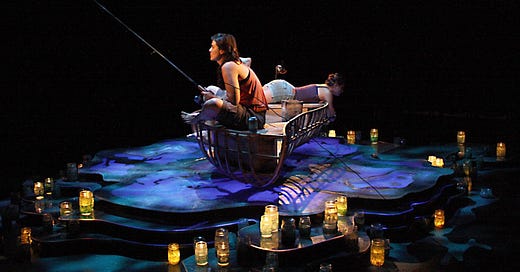21 Things I Know About Playwriting
I wrote my first play twenty years ago. I wrote my second play one year later. Here are 21 things I learned in the year between the two.
I wrote my first play twenty years ago. I wrote my second play one year later. Here are 21 things I learned in the year between the two:
Dialogue: Use less. Same with exposition.
Stage directions: They are not your boss - and - you are not their bitch. Explore the wonders of this art form (and it IS an art form). If someone comes to you with some BS about stage directions, throw it right in the trash.
Monologues: these are great for covering a lot of ground but try chopping them into dialogue (even if just as an experiment) to create tension. Sometimes a monologue is really a soliloquy.
Punctuation: learn the fine distinctions between a period, a hyphen, an ellipsis. Sometimes a rhetorical ends with a question mark. Sometimes a non-rhetorical ends with a period. Punctuation can be used ironically to great effect. An ellipsis (…) at the end of a sentence is a great way to build tension. It opens a loop and pulls the listener in.
Leave some things unspoken.
Leave some things unsaid.
Leave some things unheard.
Leave some things unanswered.
Don’t depend on actors and directors to find opportunities for the beats and silences. Build them in. This is your prerogative.
Silence is good.
Write the dramatic rise of the play backwards to suss out drivers and action that truly energize you as a writer.
Longer isn’t better.
Never use a throwaway tag, no matter how artfully written, as an ending.
Offstage sounds, noises, as well as the antics of offstage characters are a great way to drive action.
Sometimes - strike that - OFTEN, nature or atmosphere is another character. Getting specific with this is a way to pull the reader in. Paint this texture in your stage directions, everyone will thank you for it. And then find ways to remember this “character” in other parts of the play. EG: Is there a storm approaching? Does it smell like garbage in this lunchroom? Is the heat oppressive? Is there a highway nearby? A tree line? A factory in the distance?
The antagonist has hopes and dreams too.
Create a recurring nuisance for a character. I invented a word for this: “fruit-flying.” (See more on "fruit-flying" on my playwright vocabulary page.) It's a powerful way to create recurring levity which in turn fosters a level of trust between you and your audience. Everyone loves the “running gag.” Some of us live for it.
I cannot say this loudly enough: the non sequitur is a powerful tool. It’s perfectly allowable to bring a knockdown drag out fight to a screeching halt to interject something funny. Unexpected. Or random. Trust that your audience knows how to complete the circle. Your play need not be linear (you’re building a composite, a portrait, not following some straight line). If you knew that no matter what order things were laid out in your play, the audience would still be able to follow along, would you play more, experiment more?
Lawn chairs cannot be trusted.
Find the joy and the hope in your deep dark play. It’s there somewhere, we need to see at least a spark of it.
There is plenty of conflict and roller coaster action to be found in simply watching any relationship form, flounder, or fall apart. Even the most political of plays can be a character study. Remember, people don’t fall in love with plot, they fall in love with people. So, if you have to choose between making a point or exposing the pathos, always choose the pathos… I promise you, the points will make themselves.
Share this post with a writer in your life. Happy writing! - Audrey

LEAN MORE ABOUT AUDREY
Visit my website for more about me and the work I do!
QUICK LINKS TO MY PLAYS
Audrey Cefaly's plays (Alabaster, Maytag Virgin, The Gulf, The Last Wide Open, Trouble) have garnered the Lammy Award, the Calicchio Prize, the Edgerton, and a Pulitzer nomination. Her works have been produced at Signature Theatre, Cincinnati Playhouse, Barter Theatre, Merrimack Rep, Florida Studio, Florida Rep, Gulfshore Playhouse, and countless others. Cefaly is a Dramatist Guild Foundation "Traveling Master," an Arena Stage playwright cohort, and a recipient of the Walter E. Dakin Fellowship from the Sewanee Writers Conference. She is published by Concord Theatricals.
Thanks for reading Audrey’s Newsletter! Subscribe for free to receive new posts and support my work.





Write the dramatic rise of the play backwards to suss out drivers and action that truly energize you as a writer. " Have ypu elaborated on this somewhere? (loving this newsletter)
“pathos” 👍 … a “crisis of empathy” that (potentially) brings the audience to their knees? I am working backwards, and then forwards, to bring tgese moments into existence